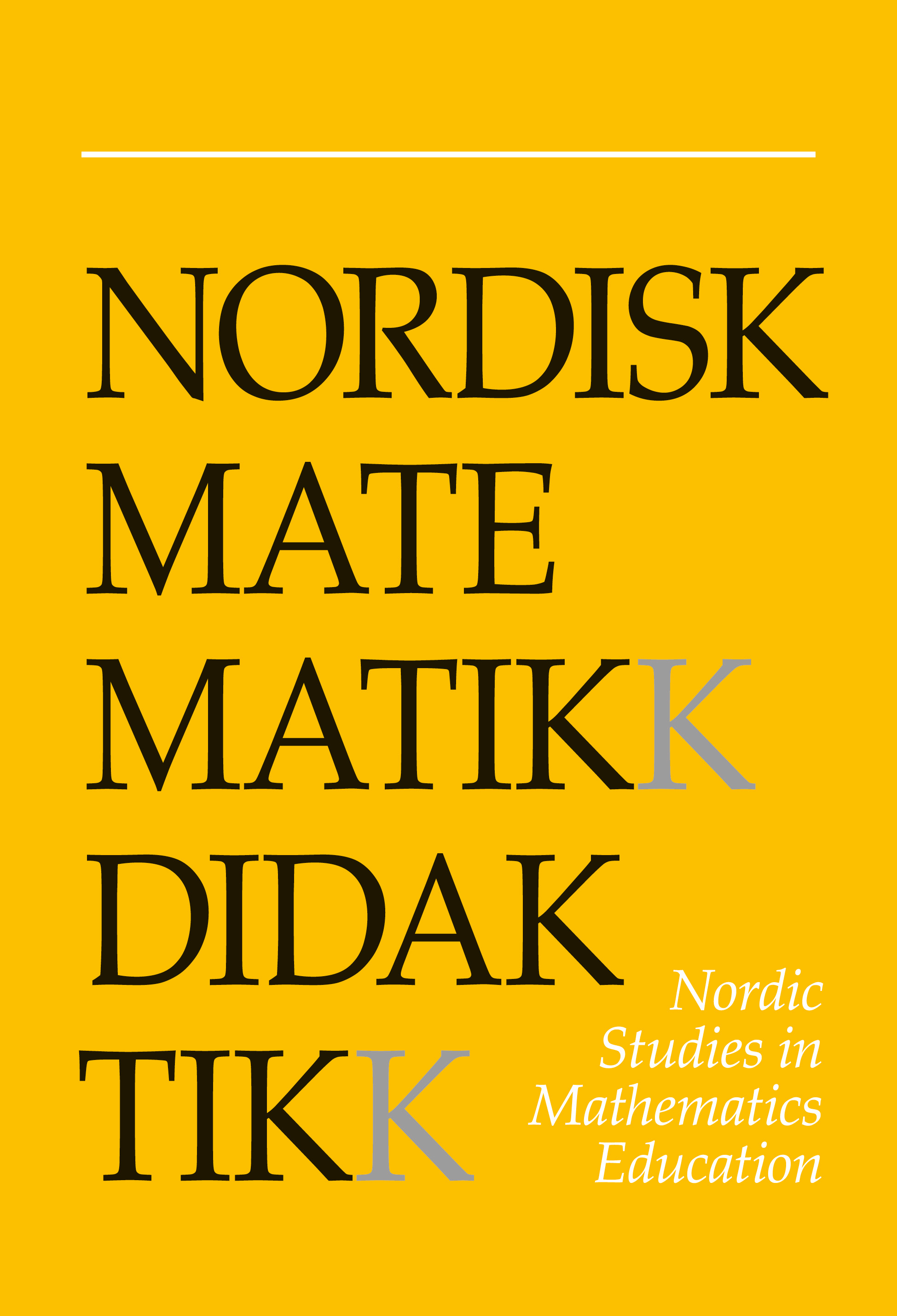An agenda for mathematics education in the decade of education for sustainable development
DOI:
https://doi.org/10.7146/nomad.v12i3.148035Abstract
The United Nations declared 2005 to 2014 as the Decade of education for sustainable development. This presents an opportune moment for mathematics educators and mathematics education researchers to reflect about the effectiveness that mathematics education has had in creating citizens for a sustainable future. There is an important distinction between education about sustainable development, and education for sustainable development; the latter is the more important, but also the more difficult and challenging. The paper examines some of the obstacles that mathematics educators face in educating for sustainable development, and identifies the need for some radical alternatives. These alternatives will need to challenge the dominant discourses that shape identities of both learners and teachers.
References
Australian Bureau of Statistics (2006). Measures of Australia's progress. Canberra: Commonwealth of Australia.
Beck, U. (1995). Ecological enlightenment: essays on the politics of the risk society. New Jersey: Humanities press.
Bennett, D. (2001). Development of sustainability concepts in Australia. In J.Venning J.Higgins(Eds.),Towardssustainability:emergingsystemsfor informing sustainable development (pp. 22-47). Sydney: UNSW Press.
Bessot, A. & Ridgway, J. (Eds). (2000). Education for mathematics in the workplace. Dordrecht: Kluwer.
Blewitt, J. (2004). Introduction. In J. Blewitt & C. Cullingford (Eds.), The sustainability curriculum: the challenge for higher education (pp. 1-9). London: Earthscan.
Carson, R. (1962). Silent spring. London: Penguin.
Castells, M. (2001). The internet galaxy: reflections on the internet, business and society. Oxford: Oxford University Press. https://doi.org/10.1007/978-3-322-89613-1
Club of Rome (1972). Limits to growth. New York: Universe Books.
Cullingford, C. (2004). Conclusion: the future - is sustainability sustainable? In J. Blewitt & C. Cullingford (Eds.), The sustainability curriculum: the challenge for higher education (pp. 245-252). London: Earthscan.
D'Ambrosio, U. (1985). Ethnomathematics and its place in the history and pedagogy of mathematics. For the learning of mathematics, 5 (1), 41-48.
D'Ambrosio, U. (1999). Literacy, mathemacy, and technocracy: a trivium for today. Mathematical Thinking and Learning, 1 (2), 131-153. https://doi.org/10.1207/s15327833mtl0102_3
Davis, P. J. & Hersh, R. (1986). Descartes dream: the world according to mathematics. London: Penguin Books.
Dorling, D. & Simpson, S. (Eds.) (1999). Statistics in society: the arithmetic of politics. London: Arnold.
Foran, B. & Poldy, F. (2002). Future dilemmas: options to 2050 for Australia's population, technology, resources and environment. Retrieved February 20, 2004 from http://www.cse.csiro.au/research/futures/futuredilemmas/index.htm
Frankenstein, M. (1989). Relearning mathematics: a different third r - radical maths. London: Free Association Books.
Freire, P. (1972). Pedagogy of the oppressed. London: Sheed and Ward.
Gellert, U., Jablonka, E. & Keitel, C. (2001). Mathematical literacy and common sense in mathematics education. In B. Atweh, H. Forgasz & B. Nebres (Eds.), Sociocultural research on mathematics education (pp. 57-73). New Jersey: Lawrence Erlbaum.
George, S. (2004). Another world is possible if .... London: Verso.
Hamilton, C. (2003). Growth fetish. Sydney: Allen & Unwin.
Hamilton, C. (2001). Running from the storm: the development of climate change policy in Australia. Sydney: UNSW Press.
Hay, P. (2002). Main currents in Western environmental thought. Sydney: UNSW Press.
Holland, D. et al. (1998) Identity and agency in cultural worlds. Cambridge, MA: Harvared University Press.
Jablonka, E. (2003). Mathematical literacy. In A.J. Bishop, M.A. Clements, C. Keitel, J. Kilpatrick & F.K.S. Leung (Eds), Second international handbook of mathematics education (pp. 75-102). Dordrecht: Kluwer. https://doi.org/10.1007/978-94-010-0273-8_4
Johnston, B. & Yasukawa, K. (2001). Numeracy: negotiating the world through mathematics. In B. Atweh, H. Forgasz & B. Nebres (Eds.), Sociocultural research on mathematics education (pp. 279-294). New Jersey: Lawrence Erlbaum.
Knijnik, G. (1992). An ethnomathematical approach in mathematical education: a matter of political power. For the learning of mathematics, 13 (3), 23-26.
Mezirow, J. (1990). How critical reflection triggers transformative learning. In J. Mezirow & Associates (Eds). Fostering critical reflection in adulthood. (pp. 10-20). San Francisco: Jossey-Bass Publishers.
Nixon, S. (2006, May 26). If only they knew - car's true costs so much more. Sydney Morning Herald. Retrieved May 28, 2006 from http://www.smh.com. au/news/national/if-they-only-knew/2006/05/26/1148524888415.html.
Penteado, M. G. & Skovsmose, O. (2002). Risks include possibilities. Roskilde: Centre for Research in Learning Mathematics, Roskilde University.
Skovsmose, O. (2005). Foregrounds and politics of learning obstacles. For the learning of mathematics, 25 (1), 4-10.
Skovsmose, O. (1994). Towards a philosophy of critical mathematics education. Dordrecht: Kluwer. https://doi.org/10.1007/978-94-017-3556-8
Skovsmose, O. & Valero, P. (2001). Democratic access to powerful mathematical ideas. In L. English (Ed.), Handbook of international research in mathematics education (pp. 383-407). New Jersey: Lawrence Erlbaum.
Tully, C. (2003). Growing up in technological worlds: how modern technologies shape the everyday lives of young people. Bulletin of Science, Technology & Society, 23 (6), 444-456. https://doi.org/10.1177/0270467603260812
UNESCO & UNEP (2001). Youth, sustainable consumption patterns and life styles. Retrieved January 20, 2005, from http://unesdoc.unesco.org/ images/0012/001242/124238e.pdf
Watson, I., Buchanan, J., Campbell, I. & Briggs, C. (2003). Fragmented futures: new challenges in working life. Sydney: The Federation Press.
WCED. (1987). Our common future. Oxford: Oxford University Press.
Wedege, T. (2000). Technology, competences and mathematics. In D. Coben, J. O'Donoghue & G. E. FitzSimons (Eds.), Perspectives on adults learning mathematics: research and practice (pp.191-207). Dordrecht: Kluwer. https://doi.org/10.1007/0-306-47221-X_11
Zevenbergen, R. (2004). Technologizing numeracy: intergenerational differences in working mathematically in new times. Educational Studies in Mathematics, 56, 97-117. https://doi.org/10.1023/B:EDUC.0000028399.76056.91
Downloads
Published
How to Cite
Issue
Section
License

This work is licensed under a Creative Commons Attribution-NonCommercial-ShareAlike 4.0 International License.



